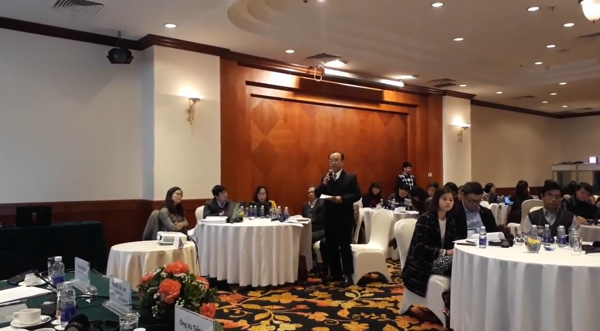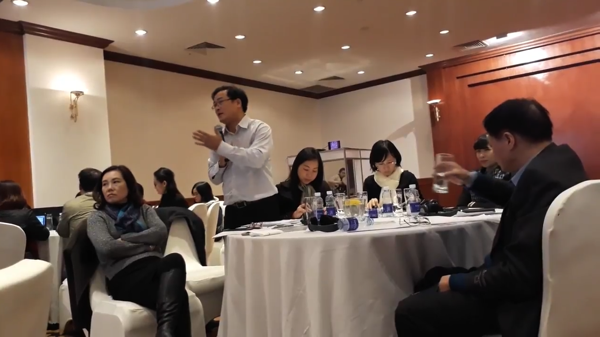Feb 2 2018 12:00AM GMT + 7
The annual minimum wage increase is unreasonable
The Government has recently issued Decree No. 141/2017 / ND-CP regulating the regional minimum wage level for laborers working under labor contracts. From 1/20/2018, the minimum wage in Region I is 3,980,000 VND / month; Region II is 3,530,000 VND / month, Region III is 3,090,000 VND / month, and Region IV is 2,760,000 VND / month (an average increase of 6.5%). Thus, the regional minimum wage level is about 180,000 to 230,000 VND / month higher than the current salary. From 2008 to 2017, the government increased the minimum wage 10 times with the high rate, in which domestic enterprises increased by 5.96% on average, CPI increased by 8.77%, and the labor productivity increased by 3.65%.
According to the opinions of the enterprises, the unbalance of the current minimum wage increase among the areas has caused difficulties for the businesses. Mr. Truong Van Cam, vice chairman of the Vietnam Textile and Apparel Association, said that the minimum wage increase has made a reduction in profits and competitiveness of enterprises. "Increasing the minimum wage will increase the amount of premiums, trade union funds and costs, and decrease profits and competitiveness. The increase in wages also reduces employment opportunities, especially the expansion of production to remote areas, because if the minimum wage is too high, the enterprises will not be able to pay for the workers. On the other hand, the increase in minimum wage also reduces the attractiveness of FDI into labor-intensive industries, or the 4.0 revolutionary applied by FDI enterprises will run to the areas with lower minimum wages. "

Mr. Truong Van Cam, Vice Chairman of Vietnam Textile and Garment Association
Mr. Nguyen Xuan Duong, Chairman of Hung Yen Business Association, said that: "the government needs to stop raising the regional minimum wage, or consider salary increase once every 2 to 3 years so that the enterprises and employees will be able to thrive ..."

Mr. Nguyen Xuan Duong, Chairman of Hung Yen Business Association
Representing the seafood enterprises, Mr. Nguyen Hoai Nam, Deputy General Secretary of the Vietnam Association of Seafood Exporters and Producers (VASEP), said that the increase of minimum wage will put pressure on increasing the price of products. Mr. Nam proposed that the Ministry of Labor, Invalids and Social Affairs should speed up the amendment and supplement of the law to submit to the National Assembly early to help remove difficulties for enterprises earlier.

Mr. Nguyen Hoai Nam, Deputy General Secretary of Vietnam Association of Seafood Exporters and Producers (VASEP)
Recommendation for changing overtime to 400 - 600 hours per year.
Overtime working of the workers at factories in Vietnam has received much attention from enterprises and associations at the conference. According to the opinion of the majority of enterprises, the employees mainly want to work overtime to increase their monthly income and improve their living condition. Regarding Article 4, Decree No. 45/2013 / NĐ-CP stipulates overtime hours of 200-300 hours per year. This makes it difficult for businesses in increasing production, and they cannot timely respond to orders in peak occasions. Dao Thi Huyen, representative of Japanese business association in Vietnam, said that it is necessary to increase overtime to 400-600 hours per year. Japanese companies are very compliant with Vietnamese laws; however, their overtime can hardly create enough impact on the supply to the market. Japanese enterprises are also afraid that the Government of Vietnam will continue to keep the overtime as it is now. Therefore, they may take careful consideration before investing in Vietnam, especially in labor intensive sectors.
.png)
Ms. Dao Thi Huyen, representative of Japan Business Association in Vietnam
Answering the questions and recommendations of the businesses, Mr. Bui Sy Loi, Deputy Chairman of the Committee on Social Issues of the National Assembly, said that the increase of overtime will lead to the increase of labor accidents. Therefore, when the Labor Code was drafted in 2012, the Government controlled the risk by reducing the overtime, which is a humanitarian policy in line with the rules and trends. On the other hand, many seasonal enterprises need more time to complete the production. In addition, the workers themselves want to work overtime to increase their income. In order to meet the needs and desires of the different parties, it is necessary to calculate reasonable overtime hours, to avoid accidents due to overwork.